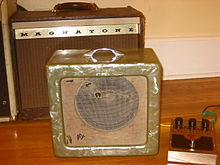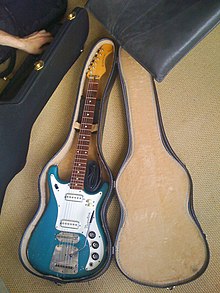Magnatone

rear: Magnatone 213 Troubador (c.1957)[2] providing true vibrato called F.M.Vibrato.

Magnatone was a brand of electric guitars and amplifiers produced between 1937 and the mid-1970s. The company was based in California. The brand name was revived in the 2010s by Ted Kornblum.
History
Magnatone amplifiers began in the late 1930s as the Dickerson Musical Instrument Company founded by Delbert J. Dickerson in southern California. Beginning in the late 1930s, Magna Electronics was known as Dickerson Musical Instrument Manufacturing Company and produced amplifiers, Hawaiian and steel guitars.[3]
In the 1940s, Gaston Fator Guitar Studios in Los Angeles bought the business from Dickerson. Fator owned it for a few years, and then sold it to Art Duhamell around 1946, who changed the name to Magnatone.[3]
In the 1950s and 1960s, the company produced vibrato-equipped amplifiers which were used by musicians including Buddy Holly[4] and Lonnie Mack. The 'real' vibrato effect called F.M. Vibrato[5][6] was distinct in sound and design from the more common tremolo circuits found on Fender amplifiers.
In the hands of its new owner, Art Duhamell, the amplifier and guitar brand name was changed to Magnatone, and the company name was Magna Electronics Company. Duhamell built Magnatones alongside record players, radios, and speakers. By 1950, Magna expanded from their Jefferson Boulevard, Los Angeles location with three new buildings at 9749 S. Freeman Ave. and employed more than twenty-five employees.
Paul Bigsby designed solid-body guitars for Magnatone from 1955–1957.[7]
Pioneering blues-rock guitar soloist Lonnie Mack used Magnatone vibrato amps almost exclusively.[8] A Magnatone amp was also the basis of the signature guitar sound of Robert Ward. They are still used today by musicians including Neil Young, who uses a 280 Stereo in his live rig.[9]
Revival
The brand was revived in early 2013 with a line of boutique amps, some of which are reproductions of previous Magnatone designs. The brand name was revived by Ted Kornblum (formerly of Ampeg and St. Louis Music),[9] and input on the amps' respective designs was provided by Billy Gibbons and Neil Young's guitar tech, Larry Cragg. The new line of six different Magnatone models debuted at the 2013 NAMM Show in Anaheim, California.[10]
References
- ^ "Magnatone M-197-3-V Varsity Model", Zack Engineering's Unofficial Magnatone Site, archived from the original on 2012-12-28, retrieved 2013-04-23
- ^ "Magnatone Custom 213 Troubadour", MagnatoneAmps.com
- ^ a b Guitarist (2014-08-19). "Magnatone amps: a history, and the rebirth". MusicRadar. Retrieved 2024-01-16.
- ^ Hunter, Dave (September 2011). "Buddy Holly's '58 Magnatone 280". Vintage Guitar.
- ^
"F.M. Vibrato". Magnatoneamps.com.
In sales literature, Magna called the vibrato "F.M. Vibrato" for full modulation vibrato). Whereas most other companies incorrectly labeled volume modulation as vibrato, Magnatone's vibrato was true pitch shifting vibrato.
- ^ US patent 2988706, Don L. Bonham, "Vibrato circuit comprising a bridge having non-linear impedance elements", issued 1961-06-13
- ^ Babiuk, Andy (2009). The Story of Paul Bigsby: Father of the Modern Electric Solidbody Guitar. pp. 131–32. ISBN 9780615243047.
- ^ See, Wikipedia article on Mack, subheading "Mack's guitar and gear"
- ^ a b Prown, Pete (March 2015). "Less is More, Plus: The Magnatone Varsity". Vintage Guitar. p. 146.
- ^ "Bringing Back The Magnatone" (PDF). The Music Trades. 164 (1). February 2016. Retrieved 25 April 2019.
External links
- Ahern, Douglas (2011–2013). "The History of the Magnatone Amplifier". Magnatone.
- Teagle, John. "Magnatone Amps". Vintage Guitar. No. April 1998. — an overview of Magnatone amplifiers
